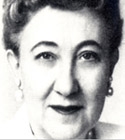Charlotte
Buhler

(1893-1974)
Biography
Born Charlotte Malachowski in
Berlin, Germany on December 20, 1893. Charlotte’s mother, Rose was a musician
while her father, Walter was an architect. Charlotte married Karl Buhler in 1916 and had
her first daughter in 1917. She also had a son in 1919. Buhler received her
Bachelor’s (BS) in 1915 from the University of Berlin and her PhD in 1918 from
the University of Munich. Her husband Karl was put in prison for his anti-Nazi
opinion but Charlotte was able to get him released and they moved to the United
States. She earned American citizenship in 1945. After her great contributions
to the humanistic movement and her research in life-span development psychology
Charlotte Buhler returned to Germany where she died February 3, 1974 in
Stuttgart, West Germany.
Major Contributions
Buhler’s research focused on
adolescents and infants. She used diaries to study adolescents and discovered
that infants are intentional and curious even in their first months. Buhler
developed tests to assess child development that are still in practice today. While
in the U.S. Buhler set up a child guidance clinic in Worcester, Mass. She later
worked as a clinical psychologist. Her
theoretical and clinical work corresponded well with Carl Rogers and Abraham
Maslow. She later worked with Maslow and Rogers as a primary contributor to the
humanistic movement. In 1970 Buhler presided over the First
International Conference on Humanistic Psychology in Amsterdam, The
Netherlands. Buhler’s theory of life goals is similar to the well known
Maslow’s Hierarchy,
“1.
The tendency to strive for personal satisfactions in sex, love, and ego
recognition
2. The tendency
toward self-limiting adaptation for the purpose of fitting in, belonging, and
gaining security
3. The tendency
toward self-expression and creative accomplishments
4. The tendency
toward integration or order-upholding”